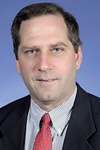CONSHOHOCKEN, Pa. - If Air Products Healthcare began a new chapter late last year, when CEO Bob Cucuel left, Dave Hunter is its new author. Hunter signed on to take the helm at Air Products Healthcare Oct. 1, 2005, after serving as COO for three years. Hunter, who's in his mid-forties, has logged some 17 years with parent company Air Products (mostly in finance). He also has an undergraduate degree in chemical engineering and a graduate degree in business. While a relative newcomer to the HME industry, Hunter believes his time with the company--most of his professional life--and his financial knowledge will help Air Products Healthcare stage an "evolution" in 2006. Hunter recently spoke to HME News about that, as well as the company's strategies for everything from competitive bidding to acquisitions.
HME News: What's the same/different since Cucuel left?
Dave Hunter: The strategies that exist today are still very consistent with the strategies that Bob embarked on over six years ago (when he began rolling up American Home Care Supply). We're still trying to create the premiere homecare company in the United States. For us, premiere is defined as the company that's the best at providing quality patient care, the best to work for and the best to invest in.
HME: In his last interview with HME News, Cucuel said providers should streamline their operations if they want to survive competitive bidding and other reimbursement changes. Is that a priority?
Hunter: That is a key area of focus. Something we do differently from our competitors is that, while we're trying to develop improved work processes on a corporate level, we're also trying to take tools out to the field. This way, our front-line employees can use them to streamline their local operations, as well.
HME: What other areas does Air Products Healthcare plan on focusing on?
Hunter: As always, we're focusing on top-line growth by looking at new marketing programs that address what we bring to market. We're also looking at operational areas: how we're providing patient care, and how we're delivering products and services to our customers. We're asking ourselves how we can do those things more efficiently. On an ongoing basis, we're looking at ways to improve back-office operations. In general, we're trying to bring new and creative ideas to the table, so we can develop different solutions for work processes and, at the same time, apply and use technology to improve overall productivity.
HME: Does having Air Products as a parent company help in these efforts?
Hunter: Air Products is an $8 billion corporation. With that comes a lot of experience and expertise in how to use management tools and technology. We want to combine that with the skills, experience and expertise of the folks that we already have on the Air Product's healthcare team.
HME: How do you see the HME market shaking out for small and larger providers under competitive bidding and other reimbursement changes?
Hunter: To continue providing efficient patient care, we're all going to have to think more creatively about how we can operationalize what we do on a day-to-day basis to maintain profitability. Do I think that's going to make it more difficult for smaller providers? I'm not sure. The one thing that I continue to see: There's such a low barrier to entry in this industry, and there are so many creative people out there coming up with new ideas to fit into this space. I'm not sure we'll ever get to a place where all smaller providers would be squeezed out. But I do think it's going to be tougher for them, when a company like ours has technology and the resources associated with scale and size on its side.
HME: Is the current Medicare landscape Air Product Healthcare's greatest challenge?
Hunter: It's one of the most significant challenges. But as a company, we're also in the midst of an evolution, as we continue to go through the rapid growth of the companies that we have acquired. How do we balance between integrating those companies and allowing the entrepreneurial spirits of the owners to continue to grow and flourish in their local marketplaces? That's as much of challenge as the reimbursement pressures we're seeing in Washington.
HME: What's Air Products Healthcare's acquisition strategy?
Hunter: Our strategy is to continue to grow aggressively through acquisitions, but given the uncertainty on the legislative front right now, we're waiting to see how things play out. We're taking this opportunity to focus more energy and efforts on organic business development and identifying and executing plans to improve operations.
HME: Air Products Healthcare has acquired some large providers--providers who, some would say, have maxed out their growth potential. Does that limit the company's growth potential?
Hunter: The companies that we are acquiring are growing very rapidly. We understand that that kind of growth, given the underlying demographics of the local marketplace, is tough to sustain. But at the same time, we're looking to foster the same entrepreneurial spirit that made those companies successful and delivered that growth to continue pushing that. Also, the companies that we acquire, often times, don't have our full product lines (respiratory, DME, rehab and infusion), giving us opportunities for greater growth.




Comments